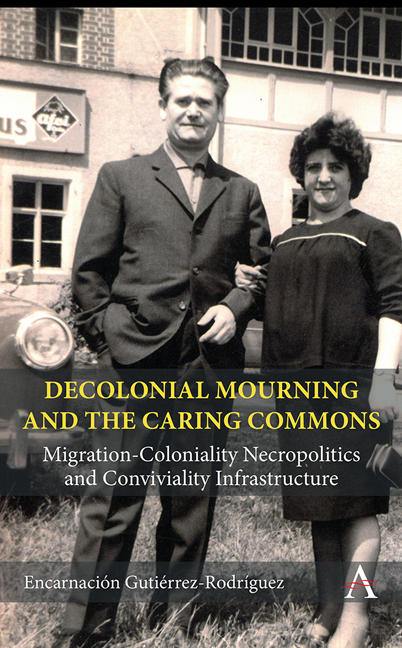 Decolonial Mourning and the Caring Commons
Decolonial Mourning and the Caring Commons Book contents
- Frontmatter
- Contents
- Acknowledgments
- 1 Introduction: Entangled Mournings
- 2 Trauerarbeit: Decolonial Mourning
- 3 Political Mourning
- 4 Countering Necropolitical Social Reprodution
- 5 Accountable Mourning: Bearing Witness
- 6 Communal Mourning: Becoming-With
- 7 Mourning’s Justice: Conviviality Infrastructure of a Caring Commons
- Notes on Author
- References
- Index
7 - Mourning’s Justice: Conviviality Infrastructure of a Caring Commons
Published online by Cambridge University Press: 29 February 2024
- Frontmatter
- Contents
- Acknowledgments
- 1 Introduction: Entangled Mournings
- 2 Trauerarbeit: Decolonial Mourning
- 3 Political Mourning
- 4 Countering Necropolitical Social Reprodution
- 5 Accountable Mourning: Bearing Witness
- 6 Communal Mourning: Becoming-With
- 7 Mourning’s Justice: Conviviality Infrastructure of a Caring Commons
- Notes on Author
- References
- Index
Summary
Introduction: No Time to Mourn
Also ich bin mir hundert Prozent sicher, solange wir keine Aufklärung bekommen und solange wir keine Gerechtigkeit bekommen, werden die Menschen nicht in ihren Gräbern ruhen.
Gamze Kubaşık and Elif Kubaşık in conversation with Onur Suzan Nobrega. (2021c, 76)Das Kämpfen hat mich daran gehindert zu trauern.
(ibid., 62)The words of Gamze Kubaşık above are from a conversation she and her mother, Elif Kubaşık, had with Onur Suzan Nobrega in April 2021. Gamze's father, Mehmet Kubaşık, was murdered by the NSU (Nationalist Socialist Underground) on 4 April 2006. Commemorating their loss, Gamze and Elif Kubaşık reaffirm their constant search for justice. Echoing other family members, relatives and friends of the victims of racist violence, they recount how they experienced a second racist attack after the loss of their loved one. The families of the victims could not withdraw and mourn on their own time and in their own way, as they were confronted with police investigations that treated them and their lost loved ones as prime suspects (Tribunale 2021). Additionally, access to the dead bodies of their loved ones was restricted and they were unable to mourn in accordance with their personal wishes and religious customs.
While the families mourned the loss of their loved ones, the German public remained mostly silent (Michaelsen 2015). There was no nationwide public mourning at the moment these racist crimes were revealed, nor did crowds gather in public squares to grieve for the loss of these members of German society. Despite their insistence on creating their own representation, vocabulary and analysis concerning the origin and nature of the murders and communicating this to the public, the families received no response or gesture of shared grief from the wider political and civil society (Utlu 2013). This environment has led to what Gamze Kubaşık defines as the impossibility to have time to mourn or what Çiğdem Inan (2022) describes as “dispossessed mourning”, defining the inability of a politics of grief under circumstances of racist violence. Yet, as I have shown throughout this book, the families, relatives and friends have continued to raise their voices and make their views known notwithstanding the hurdles and barriers confronting them.
- Type
- Chapter
- Information
- Decolonial Mourning and the Caring CommonsMigration-Coloniality Necropolitics and Conviviality Infrastructure, pp. 171 - 196Publisher: Anthem PressPrint publication year: 2023


